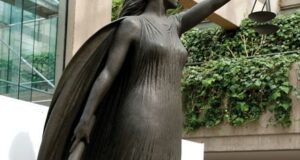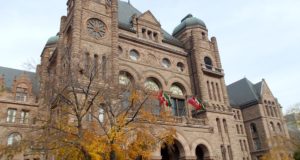Barry W. Bussey is Director Legal Affairs, Canadian Council of Christian Charities. He blogs at: lawandreligion.org. The following is an excerpt of his article, “The Charter is Not a Blueprint for Moral Conformity,” (2017) 79 S.C.L.R.(2d) 367, 393-400
It may be trite to say that a liberal democracy must respect the rule of law.[1] Lord Bingham described the core principle of the rule of law as follows: “The core of the existing principle is, I suggest, that all persons and authorities within the state, whether public or private, should be bound by and entitled to the benefit of laws publicly made, taking effect (generally) in the future and publicly administered in the courts.”[2] Bingham’s formulation is one that emphasizes the importance of all citizens having a full and complete benefit of knowable law. Law that is not held secretly in the bosom of some elite individuals or government agency but fully ascertainable and available.
The Supreme Court of Canada described the rule of law as embracing three principles:
The first recognizes that “the law is supreme over officials of the government as well as private individuals, and thereby preclusive of the influence of arbitrary power”…. The second “requires the creation and maintenance of an actual order of positive laws which preserves and embodies the more general principle of normative order”…. The third requires that “the relationship between the state and the individual . . . be regulated by law”….[3]
The emphasis is on limiting arbitrary government power vis-à-vis the individual. Even the “‘unwritten constitutional principles’, including the rule of law, ‘are capable of limiting government actions.’”[4] However, the SCC made certain that
… the recognition of these constitutional principles . . . could not be taken as an invitation to dispense with the written text of the Constitution. On the contrary, we confirmed[5] that there are compelling reasons to insist upon the primacy of our written constitution. A written constitution promotes legal certainty and predictability, and it provides a foundation and a touchstone for the exercise of constitutional judicial review.[6]
The written text of the Constitution is of primary concern, because it “promotes legal certainty and predictability”. This is key to the TWU law school case. The SCC’s emphasis on the written text is significant. Notice,
[t]he rule of law is not an invitation to trivialize or supplant the Constitution’s written terms. Nor is it a tool by which to avoid legislative initiatives of which one is not in favour. On the contrary, it requires that courts give effect to the Constitution’s text, and apply, by whatever its terms, legislation that conforms to that text.[7]
Chief Justice Beverley McLachlin’s 2005 lecture in New Zealand vindicated the judge’s role to interpret and apply written and unwritten constitutional principles in the law.[8] In her view, the judge must “hold uncompromisingly to his or her judicial conscience, informed by past legal usage, written constitutional norms and international principles to which the nation has attorned.”[9] The judicial conscience is not synonymous with personal conscience but the commitment to uphold the rule of law. This is a conscience that “is informed by the law, in all its complex majesty, as manifested” in the past legal usage, constitutional norms, and international principles.[10] This means that when a judge is confronted with “a constitutional principle of the highest order” and “an ordinary law or executive act,” he or she will “interpret and apply the law as a whole—including relevant unwritten constitutional principles” to reconcile the constitutional norm.[11]
The TWU case is unique in that the law societies are arguing that an unwritten constitutional value of equality must trump the written constitutional right of religious freedom[12]—even though TWU is not subject to the Charter. The fact that TWU is not subject to the Charter is irrelevant according to the law societies. What is relevant, they argue, is that the societies are subject to the Charter and would be complicit in TWU’s discrimination if they accredited TWU. That is a fallacy for reasons articulated in this paper.
Considering the rule of law principle, as enunciated above, any attempt to circumvent the Charter and the human rights legislation, that is passed by a provincial legislature,[13] just because one is not in favour of those protections is problematic for the cause of justice, understood as framed by the rule of law mentioned in the Charter’s Preamble.
Consider what is currently before the Supreme Court. We have the same litigant, Trinity Western University, seeking to obtain accreditation of a new degree, as it did in the TWU 2001 case. It is being challenged because of its traditional religious understandings and practices of marriage as contained in its Community Covenant Agreement.[14] The members of the law societies, legal academy, and the legal profession do not like TWU’s position, as it offends their understanding of the Charter value of equality. They have advanced arguments using the concept of Charter values as a means of getting around the actual text of the Charter and the text of the BC human rights legislation. It truly is a remarkable development in the history of Charter jurisprudence.
The example of one law bencher will now be presented as an archetypical example of what the law is up against in this case. The Law Society of BC bencher, “being an atheist,” said he had “no horse in this race” but voted in favour of TWU in the April 11, 2014, meeting “because of something called the rule of law, which among other things, dictates that courts and administrative bodies like ours shouldn’t cherry pick the laws we like from the ones we don’t.”[15] This, considering what we have already discussed, is in line with the Supreme Court’s view on the rule of law and that of Lord Bingham.
This bencher continued, “I don’t believe we can choose to disregard the leading case on this issue just because we don’t like the case or we don’t like the covenant.” The leading case he referred to was TWU 2001. He was adamant in his position, voting in favour of TWU even though he disagreed with its Community Covenant. His grounding in the traditional understanding of the rule of law principle required that he do so.
“However,” he opined, “if the Supreme Court of Canada somehow looks at this issue again and reverses itself, I’m fine with that. Why? Because I believe in the rule of law, and the rule of law must be paramount in a free and democratic society.” [16]
The bencher’s principled approach toward the rule of law was to be sorely tested in the following months of 2014. The members of the Law Society of BC called for a special meeting, wherein they demanded that the Society yield to the majority view that TWU should not be given accreditation. Despite the law—the text of the Constitution and the human rights legislation and the TWU 2001 decision—the Law Society, faced with such organized and tenacious opposition, succumbed to the membership that voted against TWU in a referendum.
On Halloween 2014, the bencher joined with most of his colleagues to deny TWU accreditation.[17] In the span of six months, this bencher had moved his position from supporting the rule of law to embracing the rule of the majority, rather than wait for the SCC to review its TWU 2001 decision. Paraphrasing the SCC’s caution, noted above, the Society said it wanted to “avoid legislative initiatives (the human rights legislation that exempted TWU) of which [they were] not in favour.” And paraphrasing the Bencher’s own words, “administrative bodies like [the Law Society of British Columbia] shouldn’t cherry pick the laws [they] like from the ones [they] don’t.”
To do otherwise creates the very mischief the Supreme Court of Canada warned against: a lack of legal certainty and predictability. Without that certainty, no right of any person, whether in the Charter, legislation, or the common law, can be taken at face value. As pointed out by various senior members of the British Columbia law society at the public meeting debating the point, there is a legal doctrine of precedent that any honest legal analysis ought to have understood as applying to TWU. The rule of law itself is threatened by a cavalier disregard of precedent from the Supreme Court of Canada.
As TWU has learned, in the religious university setting, with every new degree being offered, it can never take the Charter, the human rights legislation, or a Supreme Court of Canada decision in its favour as conclusive assurance that it can rely on the written text, or the unwritten constitutional principles such as the rule of law, or even stare decisis for protection from further claims that it unlawfully discriminates when it does not. The governing authorities, who do not like the way TWU[18] expresses its religious view on marriage, can arbitrarily tell TWU to change its religious practices or face state retribution for having what the state considers unacceptable practices. Such arbitrary decisions by state actors can never be relied upon, because there is no consistent application of state authority in similar situations. It is like a police officer making and enforcing her own rules on the fly.
Of course, the constitutional text is capable of intrinsic growth; it is a “living tree.”[19] But it is a tree that grows “within its natural limits.” It is not meant to be a forest taking over every corner of the known universe. It is not, nor should it be, capable of denying the very rights that are guaranteed within it.
The Ontario Court of Appeal held that the Law Society of Upper Canada, being subject to the Charter and the Ontario Human Rights Code,[20] meant that “Charter and human rights values must inform how the LSUC pursues its stated objective of ensuring equal access to the profession.”[21] Paradoxically, by not accrediting the TWU law school, they are denying equal access to the profession to those who wish to practice their faith. And ONCA stated that “it was entirely appropriate for the LSUC to consider this statutory objective, informed by the values found in the Charter and HRC, when deciding whether to accredit TWU.”[22] By this flanking manoeuvre, the ONCA could get around the fact that TWU is not subject to the Charter or to human rights legislation. TWU is not bound by human rights legislation but its right to require compliance with the Code is explicitly protected by the Charter and this was recognised by TWU 2001. As noted above, the ONCA specifically held that TWU’s Covenant violated the Charter.[23] Thus the ONCA completely side-stepped the written Constitutional text, all legislative pronouncements, and the common law as expressed by the SCC in TWU 2001. What’s left to protect religious organizations like TWU when they are faced with an aggressive manoeuvre that operates not only under the guise of law but within the very administration of the laws themselves?
This manoeuvre was specifically rejected by Justice Campbell in Nova Scotia[24] and by the Nova Scotia Court of Appeal.[25] The British Columbia Court of Appeal recognized that “TWU’s admissions policy does not amount to a breach of the Charter — it is not ‘unlawful discrimination’. That is not to say that it does not have an impact on LGBTQ individuals that must be considered, but the lawfulness of TWU’s policy is significant to the balancing exercise.”[26] Even with that holding, the BCCA gave too much ground to the arguments against TWU. For what balancing is necessary after it has been determined that TWU is not subject to the Charter and that it did not unlawfully discriminate? The legal analysis is to end at that point. There is no balancing required, because there is no legitimacy to the claim that TWU was unlawfully discriminating.
How is one to view the BCCA decision? Two possibilities emerge: first, courts are sensitive to the anti-TWU claims that sexual-equality rights are in play, even though such balancing exercises are not technically required. Conducting a balancing exercise when none is required gives credence to the arguments against TWU when they would have absolutely no credibility to begin with if the context of the dispute were considered properly.[27] A second possibility is that the BCCA decision is saying that even if the balancing requirements are met, TWU still wins.
Ignoring the non-applicability of the Charter and the human rights legislation to TWU is detrimental to the exercise of religious freedom in Canada. Note what this manoeuvre does: first, it grants licence to ignore the law. The law states that TWU is not subject to the Charter or to human rights legislation. Therefore, there is no possible way, on a clear reading of the law, that TWU would have to admit into its religious university those who are not willing to abide by its Community Covenant. TWU has the right to admit those who are in sync with its religious sensibilities. The appeal to Charter values and human rights values allows that law to be ignored. Those in opposition to TWU would say, as did the Ontario Divisional Court, that TWU doesn’t have to admit those who do not agree with the Community Covenant, but then it shouldn’t expect the law societies to accredit the school. That amounts to denying accreditation because the state does not like TWU’s religious practice— a practice that is not illegal or out of the mainstream. Indeed, if Charter values includes equality and human rights[28] then the LSUC is itself not following Charter values in its relationship with TWU.
Second, removing a religious community’s ability to decide who can or cannot be a member destroys religious identity and autonomy. It becomes a mirror of the state and its requirements. Difference is not celebrated but assimilated. Conformity becomes the religion of the state and the equality/inclusion values become the basis for inequality and exclusion. Given that reality, to suggest that Canada fosters diversity becomes nothing but a noble lie: you must be diverse by being the same as public universities. Third, state coercion on fundamental religious principles such as marriage becomes a certainty. The state becomes the Leviathan that has, in Justice Campbell’s words, taken on “a secularizing mission.” The state is the new arbiter of what can and cannot be accepted as religious dogma and practice. The state becomes divine. As Philip R. Wood, a visiting professor at Oxford University, says, “If the universe has no god, we will make ourselves god.”[29]
Notes
[1] Tom Bingham, The Rule of Law (London: Penguin, 2011), points out that there is much controversy over the meaning of the ‘Rule of Law’ but that does not mean it must be jettisoned for at least three reasons: first, judges continue to rely on it – therefore it “cannot be dismissed as meaningless verbiage” (p. 6); second, references to rule of law are imbedded in international instruments (p. 6); and third, it is referred to in (in his case U.K.) legislation. In our case, our Charter specifically refers to it in the Preamble, “Whereas Canada is founded upon principles that recognize the supremacy of God and the rule of law.”
[2] Bingham, The Rule of Law, p. 8.
[3] British Columbia v Imperial Tobacco Canada Ltd, [2005] 2 SCR 473, 2005 SCC 49, at para. 58.
[4] British Columbia v. Imperial Tobacco Canada Ltd., at para. 60.
[5] In the Reference re Remuneration of Judges of the Provincial Court of Prince Edward Island [1997] 3 S.C.R. 3, at paras. 93 and 104.
[6] Reference re Secession of Quebec, [1998] 2 S.C.R. 217, at para. 53.
[7] British Columbia v. Imperial Tobacco Canada Ltd., at para. 67.
[8] Rt. Hon Beverley McLachlin, “Unwritten Constitutional Principles: What is Going on?” (2006) 4 NZJPIL 147.
[9] McLachlin, “Unwritten Constitutional Principles,” at 162.
[10] McLachlin, “Unwritten Constitutional Principles,” at 162.
[11] McLachlin, “Unwritten Constitutional Principles,” at 160.
[12] For example, the Nova Scotia Barristers Society stated in its Factum at the Nova Scotia Court of Appeal at footnote 139 on page 53:
Essentially the content of the religious right claimed and recognized by the Court is the right for a student to attend a religiously-affiliated law school safe in the knowledge that the student sitting next to them in torts class has been required not to engage in same-sex sexual intimacy in the privacy of his or her home. It is not unreasonable that religious value of this nature, if protected at all, give way when balanced against the important statutory objectives of the Society and the significant competing equality values which are at play.
[13] And presumably applied Charter “values” when it so enacted such human rights legislation.
[14] In the TWU 2001 case the “Community Standards” did not have the same wording as the current Community Covenant Agreement but the exact same traditional sexual norms. See TWU 2001 at para 4.
[15] Tony Wilson, “I voted for Trinity Western U because of the rule of law,” Globe and Mail, April 29, 2014, http://www.theglobeandmail.com/opinion/i-voted-for-trinity-western-because-of-the-rule-of-law/article18319508/
[16] Tony Wilson, “I voted for Trinity Western U because of the rule of law.”
[17] The Law Society of British Columbia, Bencher Meeting Minutes October 31, 2014 (Approved December 5, 2014), p. 10. Online, https://www.lawsociety.bc.ca/Website/media/Shared/docs/about/minutes/2014-10-31.pdf
[18] Or for that matter, any other religious person or persons.
[19] Edwards v. Attorney-General for Canada, [1930] 1 D.L.R. 98 (UK PC), at 106-107, “The B.Ν.A. Act planted in Canada a living tree capable of growth and expansion within its natural limits.” Reference re Same-Sex Marriage, [2004] 3 SCR 698, at paras. 22-30.
[20] Human Rights Code, R.S.O. 1990, c. H.19 (hereinafter “HRC”).
[21] Trinity Western University v. The Law Society of Upper Canada, 2016 ONCA 518, at para. 110.
[22] Trinity Western University v. The Law Society of Upper Canada, 2016 ONCA 518, at para. 111.
[23] Trinity Western University v. The Law Society of Upper Canada, 2016 ONCA 518, at para. 115. “I have no hesitation saying that TWU’s admission policy, viewed in conjunction with the Community Covenant, discriminates against the LGBTQ community on the basis of sexual orientation contrary to s. 15 of the Charter and s. 6 of the HRC.”
[24] Trinity Western University v. Nova Scotia Barristers’ Society, 2015 NSSC 25, at para. 10.
[25] The Nova Scotia Barristers’ Society v Trinity Western University, 2016 NSCA 59, at para. 61, “Trinity Western did not “unlawfully” violate an enactment that has no application to it.”
[26] Trinity Western University v. The Law Society of British Columbia, 2016 BCCA 423, at para. 151.
[27] And this is without considering the important suggestion by Iain Benson, in this volume, that it is time for the recognition of a legal presumption in favour of diversity in cases involving the conflict of rights.
[28] Loyola High School v. Quebec (Attorney General), [2015] 1 SCR 613, at para. 46.
[29] Philip R. Wood, The Fall of the Priests and the Rise of the Lawyers (Oxford & Portland, Oregon: Hart Publishing, 2016), p. 1.
 Advocates for the Rule of Law
Advocates for the Rule of Law



